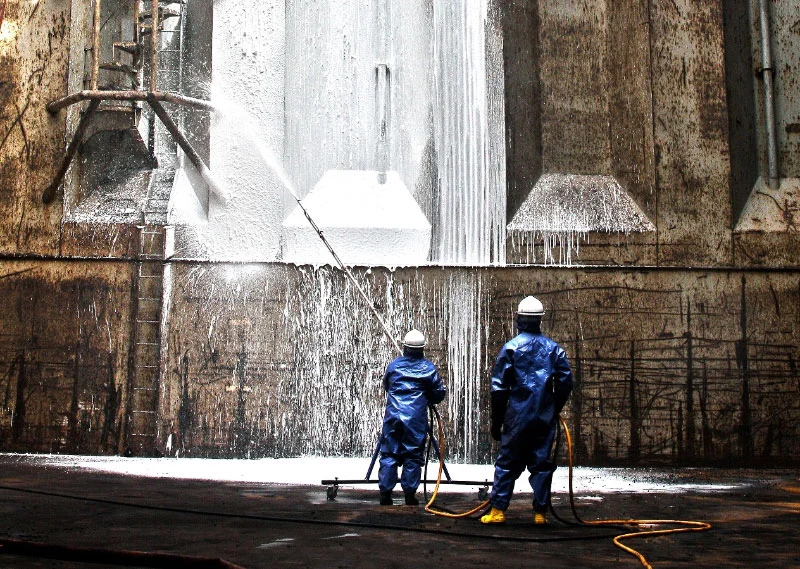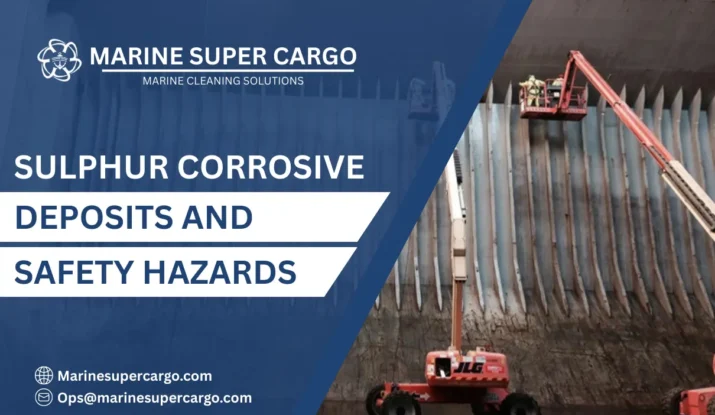Sulphur corrosive deposits and safety hazards represent critical challenges in bulk carrier operations worldwide. These hazardous materials create dangerous working conditions while causing severe structural damage to vessel components. Understanding the complex nature of sulphur corrosive deposits and safety hazards is essential for maintaining crew safety and vessel integrity throughout cleaning operations.
The transportation of sulphur generates highly corrosive residues that penetrate deep into cargo hold structures, creating immediate safety risks for personnel. Sulphur corrosive deposits and safety hazards demand specialized handling protocols and emergency response procedures. These materials produce toxic gases when exposed to moisture, creating respiratory hazards throughout affected vessel areas.
Sulphur corrosive deposits and safety hazards affect all sections of bulk carriers, from bow to stern compartments. The acidic nature of sulphur creates corrosive environments that accelerate steel deterioration and compromise structural integrity. Port and starboard holds experience varying contamination levels based on atmospheric exposure during cargo operations.
Understanding Sulphur Contamination Characteristics
Sulphur corrosive deposits and safety hazards exhibit unique chemical properties that create multiple risk factors during cleaning operations. Elemental sulphur forms acidic compounds when combined with moisture, creating highly corrosive solutions that attack steel surfaces and protective coatings throughout cargo holds.
Sulphur dust from sulphur corrosive deposits and safety hazards creates explosive atmospheres when suspended in air, requiring specialized ventilation and ignition source control. These fine particles penetrate ventilation systems and accumulate in structural recesses throughout vessel spaces. Forward holds near the forecastle often experience more severe contamination due to spray infiltration during rough weather conditions.
The hygroscopic nature of sulphur compounds means they continuously absorb atmospheric moisture, creating persistent corrosive conditions. Sulphur corrosive deposits and safety hazards generate hydrogen sulphide gas, which presents severe respiratory and neurological hazards to personnel. Professional gas monitoring becomes essential throughout all cleaning operations.
MARPOL and IMO Safety Framework
The International Maritime Organization (IMO) establishes comprehensive safety guidelines for managing hazardous cargo residues and cleaning operations. MARPOL Annex V specifically addresses waste management protocols for sulphur corrosive deposits and safety hazards removal operations.
Sulphur corrosive deposits and safety hazards cleaning must comply with SOLAS safety requirements for hazardous material handling. All personnel involved in cleaning operations require specialized training and certification. The IMO mandates detailed safety documentation and emergency response procedures for sulphur-related operations.
International safety regulations require continuous gas monitoring during sulphur corrosive deposits and safety hazards cleaning operations. Vessel operators must maintain emergency evacuation procedures and medical treatment protocols. MARPOL environmental requirements demand proper containment and disposal of all corrosive cleaning residues.

Professional Cleaning Solutions by Marine Super Cargo
Marine Super Cargo specializes in addressing sulphur corrosive deposits and safety hazards through advanced safety protocols and specialized cleaning methodologies. Our certified teams understand the critical safety requirements for handling corrosive materials and maintain strict adherence to international safety standards.
Our comprehensive approach includes continuous atmospheric monitoring throughout all cargo spaces to detect hazardous gas concentrations. We utilize specialized personal protective equipment and emergency response systems designed for sulphur corrosive deposits and safety hazards operations. Our teams coordinate closely with vessel crews to ensure complete safety protocol implementation.
Marine Super Cargo employs certified hazardous material specialists who understand the complex safety requirements for sulphur cleaning operations. We maintain emergency medical protocols and evacuation procedures throughout all cleaning activities. Our safety-first approach ensures personnel protection while achieving complete sulphur corrosive deposits and safety hazards remediation.
Critical Safety Hazards and Risk Management
Bulk carriers face severe safety complications when dealing with sulphur corrosive deposits and safety hazards. Hydrogen sulphide gas generation creates immediate life-threatening conditions requiring continuous monitoring and emergency response readiness. Corrosive vapors can cause severe respiratory damage and chemical burns to exposed personnel.
Port-side and starboard holds often display different gas accumulation patterns due to ventilation effectiveness and atmospheric conditions. Aft sections near the engine room may experience elevated temperatures that accelerate gas generation rates. Forward holds require particular attention to prevent gas accumulation in poorly ventilated structural recesses.
Professional safety management addresses these hazards through comprehensive risk assessment and continuous monitoring protocols. Emergency response teams must be immediately available throughout sulphur corrosive deposits and safety hazards operations. Specialized neutralization techniques safely manage corrosive residues while protecting personnel and vessel structures.
Prevention and Emergency Response Strategies
Preventing sulphur corrosive deposits and safety hazards complications begins with proper pre-loading safety assessments and atmospheric monitoring systems. Ensuring adequate ventilation throughout cargo spaces minimizes gas accumulation risks. Regular safety drills prepare crews for emergency response scenarios during sulphur cargo operations.
Crew training plays a crucial role in managing sulphur cargoes safely. Understanding the characteristics of sulphur corrosive deposits and safety hazards enables early hazard recognition and appropriate emergency response. Proper safety equipment maintenance ensures readiness for hazardous material incidents.
Marine Super Cargo provides comprehensive safety training programs designed to minimize exposure risks. Our services include atmospheric monitoring system calibration, emergency response planning, and specialized safety equipment provision for sulphur corrosive deposits and safety hazards operations.
Industry Safety Standards and Compliance
Maritime industry standards for handling sulphur corrosive deposits and safety hazards continue evolving with improved safety technologies and risk management approaches. Modern bulk carriers incorporate enhanced gas detection systems and automated ventilation controls. These innovations help reduce exposure risks and improve emergency response capabilities.
Safety protocols must balance thorough contamination removal with personnel protection requirements. Proper emergency planning ensures immediate response capability while maintaining operational efficiency. Sulphur corrosive deposits and safety hazards management requires coordination between safety officers, cleaning contractors, and medical support personnel.
International safety regulations demand strict compliance with hazardous material handling standards. Marine Super Cargo facilitates regulatory compliance through comprehensive safety management systems that ensure personnel protection and operational success.
Environmental and Health Protection Measures
Modern cleaning approaches for sulphur corrosive deposits and safety hazards emphasize comprehensive health protection and environmental safety. Atmospheric monitoring systems detect dangerous gas concentrations before they reach hazardous levels. Proper containment prevents environmental contamination while ensuring complete personnel protection.
Medical monitoring protocols ensure early detection of exposure symptoms and immediate treatment availability. Specialized neutralization techniques safely manage corrosive waste streams while preventing atmospheric release. These approaches align with MARPOL environmental protection objectives while maintaining the highest safety standards.
Sulphur corrosive deposits and safety hazards require specialized waste treatment facilities capable of handling corrosive materials safely. Proper documentation ensures regulatory compliance while maintaining detailed safety records for future reference.
Frequently Asked Questions
Q1: What immediate safety measures are required when encountering sulphur deposits?
A: Personnel must evacuate the area immediately, establish atmospheric monitoring, and implement emergency ventilation procedures before any cleaning operations can commence.
Q2: How dangerous are hydrogen sulphide concentrations in cargo holds?
A: Hydrogen sulphide is extremely dangerous, potentially fatal at low concentrations. Continuous gas monitoring and emergency response protocols are mandatory during all operations.
Q3: What specialized equipment is required for sulphur cleaning operations?
A: Complete respiratory protection, chemical-resistant suits, gas monitoring equipment, emergency evacuation systems, and specialized neutralization agents are essential for safe operations.
Q4: How does MARPOL regulate sulphur waste disposal?
A: All sulphur-contaminated cleaning residues must be treated as hazardous waste and disposed of at certified facilities with complete documentation according to environmental regulations.
Q5: Can sulphur corrosion cause structural failure in vessels?
A: Yes, sulphur compounds can cause severe corrosion leading to structural weakness and potential failure if not promptly treated using appropriate neutralization techniques.
For professional bulk carrier hold cleaning services specializing in hazardous sulphur residues, contact Marine Super Cargo today. Our certified safety specialists ensure complete protection while maintaining MARPOL compliance and operational excellence.


